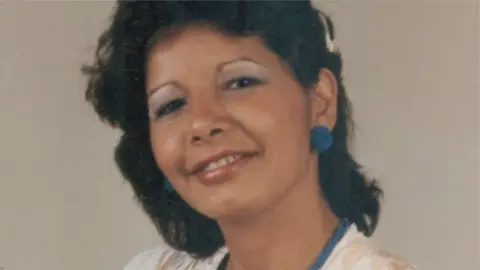Adriana Rivas: Pinochet-era kidnap suspect 'eligible for extradition'
 Storyboard media
Storyboard mediaA Chilean woman suspected of being involved in Pinochet-era kidnappings is eligible to be extradited from Australia, a court has ruled.
Adriana Rivas, 67, was arrested in Sydney in February last year.
She has denied involvement in the 1970s kidnappings of seven people which resulted in their deaths, Australian media reported.
Some 3,000 opponents of Gen Augusto Pinochet were killed in the 1970s and 1980s during his military rule.
Ms Rivas has 15 days to decide whether to appeal Thursday's decision by a magistrate in New South Wales.
Chilean authorities accuse Ms Rivas of having participated in the disappearance of the secretary-general of the Communist Party, Víctor Díaz, and six of his supporters.
Ms Rivas had worked as a secretary for the infamous chief of Chile's secret police force, Manuel Contreras.
Contreras died in 2015 while serving a sentence of more than 500 years for human rights abuses.
Ms Rivas left Chile in 1978 before working as a nanny and cleaner in Australia.
She was arrested during a visit to Chile in 2006 but managed to return to Australia. Chile filed an extradition request to Australia in 2013.
Era of persecutions and killings
Ms Rivas worked for Contreras from 1973 to 1976 at the National Intelligence Directorate (Dina), the secret police force founded by Gen Pinochet to hunt down his political opponents.
More than 40,000 people were politically persecuted during the Pinochet era, which lasted from 1973 to 1990.
Dina was at the centre of Gen Pinochet's campaign to silence opposition to his rule after he seized power in a military coup in September 1973.
Its agents abducted, tortured, killed and "disappeared" thousands of people before it was replaced by the equally brutal CNI, an army intelligence battalion.
In a 2013 interview with Australian broadcaster SBS, Ms Rivas described her years at the Dina as "the best of my life".
She described how she was given an allowance for clothes and invited to fancy balls, travelled in luxury cars and stayed at upmarket hotels.
Asked about the torture carried out by Dina agents, she said that "they had to break the people - it has happened all over the world, not only in Chile".
'Eligible for surrender'
Magistrate Philip Stewart made the ruling in Sydney's Central Local Court after a month of deliberations.
"I am satisfied the respondent is eligible for surrender," he said.
Ms Rivas's lawyer, Frank Santisi, said they were yet to decide whether to appeal.
"I'm of the view that the material simply reads as a bad indictment of the country as it was back then - it does not disclose what Ms Rivas did or did not do, in my opinion," he said, according to a report by SBS.
Earlier this week, there were jubilant scenes in Chile after an overwhelming majority voted in support of rewriting its constitution, which dates to Gen Pinochet's rule.
